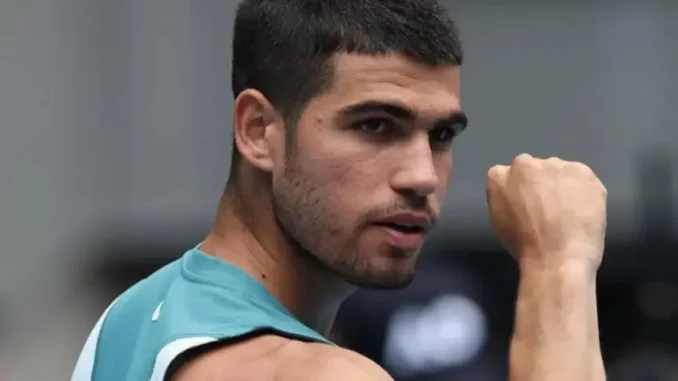
The anticipation hung thick in the air, a palpable tension that precedes any clash between a seasoned competitor and a rising phenomenon. The stage was set, the lines drawn, and the question echoed through the tennis world: how does one conquer Carlos Alcaraz? Quentin Halys, the challenger, faced this daunting task, and his candid assessment of the challenge revealed a blend of respect and determined pragmatism.
The young Spaniard, a whirlwind of athleticism and artistry, had rapidly ascended the ranks, leaving a trail of stunned opponents in his wake.1 His game, a fusion of power, finesse, and an uncanny ability to improvise, presented a formidable puzzle to even the most experienced players. Halys, however, approached the challenge with a clear-eyed understanding of the task before him.
“I need to play aggressive,” Halys stated, his words cutting through the noise of speculation. “I cannot let him dictate the points. If I let him play his game, I have no chance.” This acknowledgment of Alcaraz’s dominance was not a sign of surrender, but rather a strategic recognition of the need to impose his own style of play.
The young Spaniard’s ability to transition seamlessly between offense and defense, his lightning-fast reflexes, and his penchant for producing breathtaking winners from seemingly impossible positions made him a nightmare matchup for any opponent. Halys understood that passive play would be a recipe for disaster.
“He’s everywhere on the court,” Halys continued, emphasizing the need for relentless pressure. “You think you have an open court, and suddenly he’s there, hitting a winner. You have to be ready for anything.” This recognition of Alcaraz’s extraordinary court coverage highlighted the need for constant vigilance and unwavering focus.
The challenge, however, extended beyond the physical aspects of the game. Alcaraz’s mental fortitude, his ability to remain composed under pressure, and his unwavering belief in his own abilities made him a formidable psychological opponent. Halys understood that he would need to match Alcaraz’s mental intensity if he hoped to have any chance.
“He never gives up,” Halys observed, highlighting Alcaraz’s relentless determination. “Even when he’s down, he keeps fighting. You have to be prepared for a long and tough battle.” This acknowledgment of Alcaraz’s resilience served as a reminder that the match would likely be a test of endurance, both physical and mental.
Halys’ strategy, therefore, was not simply about hitting winners; it was about disrupting Alcaraz’s rhythm, forcing him out of his comfort zone, and imposing his own brand of aggressive tennis. He needed to dictate the tempo of the rallies, to take risks, and to capitalize on any opportunities that presented themselves.
“I need to serve well,” Halys emphasized, underscoring the importance of a strong foundation. “If I can get some free points on my serve, it will take some pressure off my return games.” This recognition of the serve’s importance highlighted the need for accuracy and power, as well as the ability to vary his serve to keep Alcaraz guessing.
The return game, however, would be equally crucial. Alcaraz’s ability to generate pace and spin on his serve made him a difficult opponent to break. Halys understood that he would need to anticipate Alcaraz’s serves, to react quickly, and to take advantage of any second serve opportunities.
“I have to be smart on the return,” Halys said, illustrating the need for tactical awareness. “I can’t just try to hit winners off every return. I need to mix it up, to use angles, and to try to get him moving.” This strategic approach highlighted the need for a blend of aggression and patience, as well as the ability to adapt to the flow of the match.
The challenge of defeating Alcaraz was not merely about technical or tactical adjustments. It was about mental fortitude, about believing in his own abilities, and about executing his game plan with unwavering conviction. Halys understood that he would need to play with courage and determination.
“I have to believe in myself,” Halys declared, his words resonating with a sense of self-assurance. “I know I have the game to challenge him. I just need to go out there and play my best tennis.” This unwavering belief in his own abilities was essential for Halys to overcome the daunting task before him.
The match, therefore, would be a test of Halys’ ability to execute his strategy, to maintain his focus, and to withstand the relentless pressure of facing one of the most talented players in the world. The challenges were significant, but Halys approached them with a clear-eyed understanding of what was required. His strategy was to be aggressive, serve well, and be smart on the return. He would need to be mentally strong, and believe in himself.
In the end, the match would be a testament to Halys’ ability to rise to the occasion, to embrace the challenge, and to leave everything on the court.
Leave a Reply